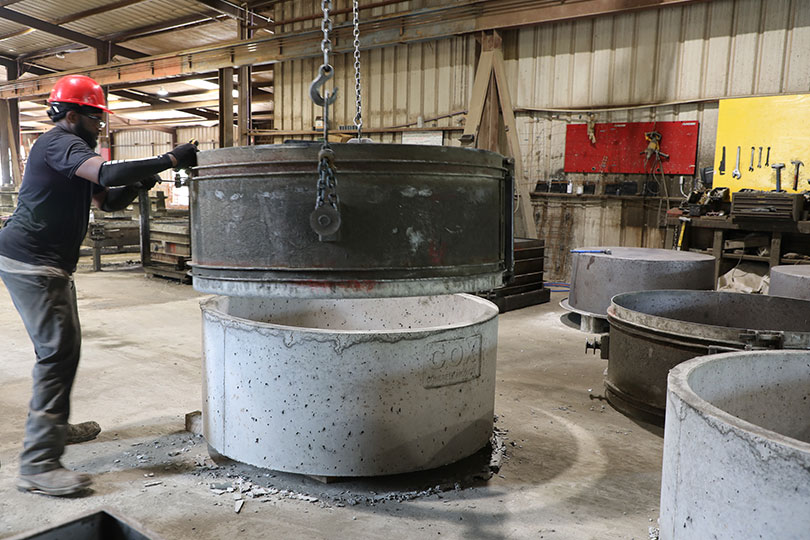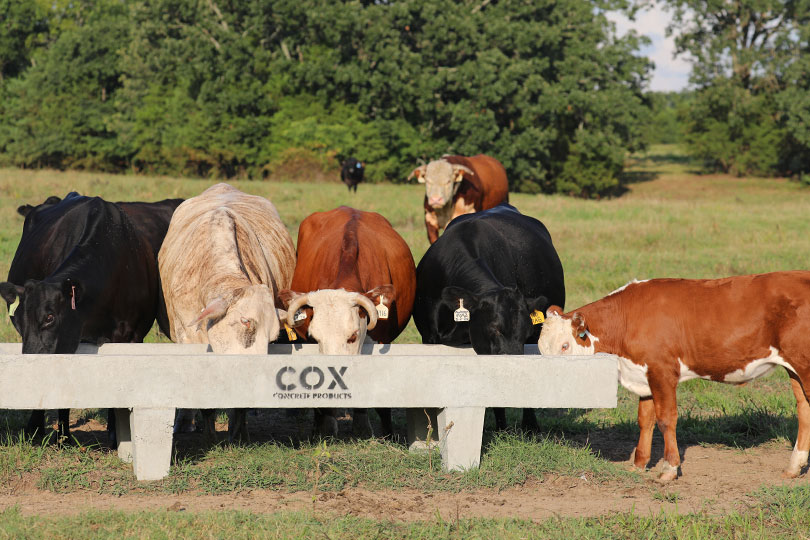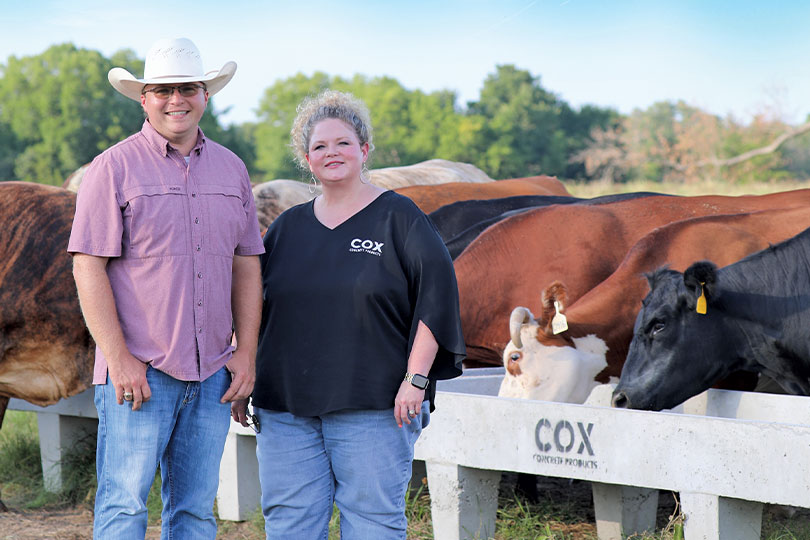By Shelby Shank
Field Editor
You could say the foundation was set in concrete.
What started as a weekend side hustle for Larry and Paula Cox in Mount Pleasant has grown into a solid business, providing pre-cast concrete products to customers across multiple states.
Cox Concrete Products specializes in heavy-duty feed and water troughs built by ranchers, for ranchers.
Today, siblings Charlotte Phillips and Ryon Cox carry on the tradition set by their parents, serving fellow ranchers with durable products designed to last for generations.
Their dad worked full-time at a steel mill but spent nights and weekends installing septic systems and culvert pipes. When sourcing materials became difficult, he saved up and bought a single concrete form.
“He would work all day at the steel mill, come home, strip a septic tank, pour another one, and work several nights a week to get that material ready for the weekends to install,” Cox said.
Eventually, their parents had enough saved to build a small shop, which is still the home of Cox Concrete Products today.
Built to last
A few years later, a local rancher approached their dad, frustrated with rubber and plastic troughs that couldn’t withstand the elements. Together, they developed a concrete trough strong enough to last for decades. And that same design is still in use today.
But the business has expanded.
Cox Concrete Products now manufactures a wide range of products, including feed and water troughs, J bunks, culvert pipes, septic tanks and even ornamental items like birdbaths and benches. The agriculture sector, however, remains the heart of their business.
“About 98% of what we produce is agricultural products,” Cox said. “We’ve ventured out into some other areas, but to this day, the bread and butter of our business is still for the working farmer and rancher.”
They partner with dealers across Texas, Oklahoma, Louisiana, Arkansas and Mississippi. But what truly sets them apart is their lifestyle. They’re not just serving ranchers, they are ranchers.
“We wake up early to feed and check cattle before coming to work,” Cox said. “And after we leave, we go home and do it again. That’s one thing that makes our brand unique, we’re ranchers that got into the precast concrete business, not the other way around.”
The family ranch dates back to the 1930s, and today they raise Hereford and Angus cattle with a focus on junior show cattle and commercial herds.
Running the family business
Cox and Phillips both returned to the family business after time away.
Phillips, who previously worked in public and corporate accounting, decided to come back to the family business in 2004.
“I left the corporate world, jet setting around, working long hours, and while that was exciting, it’s incredibly rewarding to talk to local ranchers every day and hear how our products help their ranch,” Phillips said.
Cox had plans to attend graduate school after earning his undergraduate degree, but his dad offered him a different plan.
“My dad said, ‘That’s awesome, but it’s time for you to come home if you want to take over the business,’” Cox said. “I slept on it, prayed on it, came home, and on the first day of the job, my dad said, ‘Good luck,’ and walked out.”
That handoff was only possible because of the strong foundation their parents had built.

Strength in every pour
Creating a product to last for generations starts with the materials and process behind each pour.
Every product begins with reinforcement, either with wire mesh or custom-cut and bent rebar, that is shaped into a cage and placed inside the form before the concrete is mixed.
“Our concrete isn’t like your typical sidewalk mix,” Cox said. “We pour at 6,500 PSI, which is nearly double the strength of a standard horse pad.”
PSI, or pounds per square inch, determines how well a concrete product holds up under pressure over time.
Once the form is prepped, concrete is mixed with sand, gravel, water and cement. Then, it’s poured into the molds. The mix is then hand-troweled to ensure it fills every corner with a smooth, even finish.
After curing overnight, the team strips the form, inspects each product and fills every trough with water to check for leaks. The products then sit in the yard for at least seven days before being shipped out.
The job isn’t easy.
Pouring concrete is physically demanding work, especially in the Texas heat. And in the winter, it can be hard to meet the demand for their product because the cold weather interferes with the curing process.
“Unlike other manufactures where you can add more welders and equipment, we can’t quickly scale up production,” Cox said. “Each form makes one unit per day because the concrete needs time to cure.”
A legacy in every trough
For the siblings, the satisfaction is in the results.
“I love driving past a pasture and seeing one of our troughs still standing strong next to a collapsed wooden one,” Phillips said. “That’s the kind of legacy we’re proud of.”
And for Cox, the legacy is personal.
“What drives me every day is knowing our products help families carry on their legacies. Some of our troughs have been used by three generations of ranchers,” Cox said. “This business started as a side hustle by our father, a rancher. We’re still ranchers, and no matter how large we get, I want people to talk to someone who understands this lifestyle.”
They understand it, the business and the people they serve. It’s what built the Cox Concrete brand and the foundation they continue to strengthen with every pour.



Leave A Comment